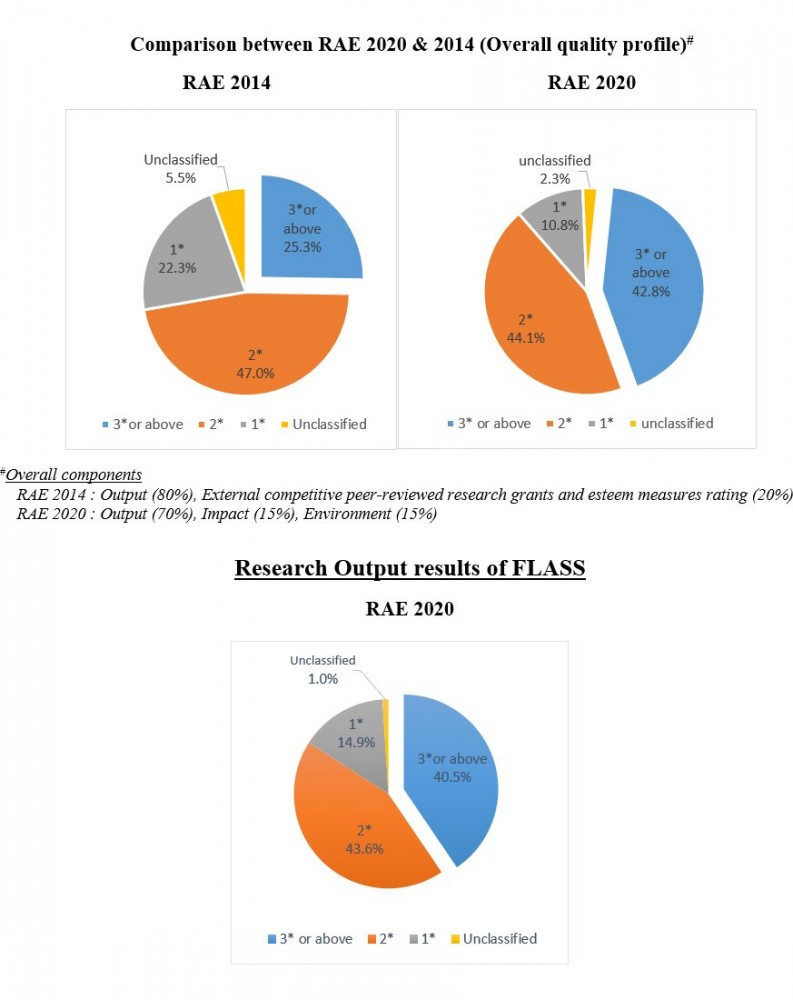FLASS's research efforts recognised by UGC's 2020 Research Assessment Exercise
FLASS is committed to conducting high-quality research that makes a real impact. The results of the 2020 Research Assessment Exercise (RAE), announced by the University Grants Committee (UGC) on 24 May 2021, confirms that our efforts in this pursuit are bearing fruit.
RAE is Hong Kong’s official scheme that assesses the research performance and achievement of the eight publicly-funded universities. RAE 2020 is a criterion-referenced assessment where each university is assessed on its overall quality profile and the three underlying sub-profiles of research output, impact and environment under 41 units of assessment (UoAs). FLASS participated in nine UoAs across the RAE panels of physical sciences; computer science / information technology; social sciences; creative arts, performing arts & design; and education.
FLASS's overall performance in RAE 2020 improved significantly compared to 2014. (The UGC conducted five RAEs in the past: 1993, 1996, 1999, 2006 and 2014.) In RAE 2020, research activities submitted by participating universities were either rated "unclassified" (the lowest rating) or were given a rating out of four stars, four (4*) being the highest.
In terms of its overall quality profile, 42.8 per cent of FLASS’s research activity was given a three-star (internationally excellent) or four-star (world-leading) rating in 2020 – a noticeable rise from 25.3 per cent in 2014. Further, 86.9 per cent of this research was either at international standing or above, compared with 72.3 per cent in 2014. In this exercise, 40.5 per cent of FLASS’s research output also received a rating of three stars or above.
Professor Daniel Chow Hung-kay, Associate Dean (Research & Postgraduate Studies) at FLASS, was delighted with the progress made over the last six years. He said, "These results reflect the hard work and talent of our colleagues across all our departments, as well as the increased strategic focus and support for research, at the university, faculty and departmental levels to strengthen the research environment."

For the RAE’s new measure of the societal impact of research, 20 per cent of FLASS’s 10 case studies across the nine units of assessment (UoAs) were given a four-star rating, thus showing "outstanding impact". A further 30 per cent had "considerable impact" (3*) in terms of its reach and significance.
The two Impact Case Studies in the political science discipline (including public policy & administration & international relations), submitted by the Department of Asian and Policy Studies, were given a four-star rating. No other university achieved a 100 per cent outstanding record for impact in this discipline. (Refer to article entitled "FLASS public policy scholars' research work rated outstanding in RAE 2020".)
At FLASS, the geography unit is made up of seven academic staff members from the Department of Social Sciences, Department of Science and Environmental Studies, and Department of Asia and Policy Studies. More than two thirds (67 per cent) of their research outputs were deemed "world leading" (4*) or "internationally excellent" (3*) – the highest among the four universities that were assessed in this discipline. In terms of the unit’s overall quality profile, 62 per cent of its research activity was "world leading" (4*) or "internationally excellent" (3*), while in terms of impact, 100 per cent of their submissions had a three-star rating, i.e. it had a "considerable impact".
For the UoA of earth sciences (including oceanography, meteorology) and other physical sciences (including environmental science), 67 per cent of the submissions by the Department of Science and Environmental Studies [under this UoA] were given a three-star rating or above in the department’s overall quality profile – a significant increase from 23 per cent in RAE 2014. Moreover, 100 per cent of its submissions were deemed to have a "considerable impact", i.e. three stars. In the UoA of physical education, sport, recreation and physical activities, the Department of Health and Physical Education saw its three-star (or above) ratings in its overall profile jump from 23 per cent to 58 per cent.
When assessing the research environment that underpins these achievements, three UoAs (i.e. earth sciences, music and performing arts, and physical education) were given ratings that demonstrated that they offered "an environment that is conducive to producing research of internationally excellent quality", i.e. three stars. Further, four (visual arts, political science, geography and sociology & anthropology) showed that they provided "an environment that is conducive to producing research of internationally recognised quality", i.e. two stars, in terms of their vitality and sustainability.
In terms of research environment, 62 per cent of the submissions in the unit of computer studies / science were given a rating of "an environment that is conducive to producing research of internationally excellent quality" or above. Twenty-five per cent of the submissions in the unit of the mathematics and statistics research were rated "internationally excellent" and 75 per cent as "internationally recognised".
Professor Chow said that it was important to reflect on the results, adding, "We can celebrate the progress but must scale up our achievements by further refining our strategy and support for scholarly research and its knowledge transfer. This should include building critical mass through greater collaboration, within the faculty, Hong Kong and the wider research community."
FLASS has been working systematically to identify, support and promote research that is making a difference. It has also been creating platforms to gather evidence of real societal change. "We are firm in our resolve to further extend this effort, paving the way for further improvement in the next RAE," Professor Chow said. The full set of RAE 2020 results can be found at the UGC website:
https://www.ugc.edu.hk/eng/ugc/activity/research/rae/2020/results.html
Overall performance profile of FLASS in RAE 2020




